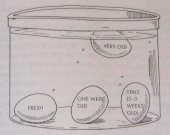




1. my projects








Idle dreamer








I'm a young and I'm not going to contort myself to fit in with our very ill society. I am a citizen of the world, not a mindless consumer. If you want to follow along with my journal, here's my blog: Life Happened Today








I'm a young and I'm not going to contort myself to fit in with our very ill society. I am a citizen of the world, not a mindless consumer. If you want to follow along with my journal, here's my blog: Life Happened Today




Seed the Mind, Harvest Ideas.
http://farmwhisperer.com




I never fail. I don't believe in it. I only succeed at finding what doesn't work.








1. my projects

















1. my projects




BlueDog wrote:
Thanks for starting this thread. I too have wondered what people feed when using something besides a packaged chicken feed.
I have a couple more questions though. When I slaughter the rabbits what can I give to the chicken? Is there anything that chickens should never be fed?




1. my projects

































Agricultural Insights Daily Podcast/Blog about Sustainable Agriculture with a focus on livestock and grazing.
The Grazing Book










The more you know, the less you need.




Ken Peavey wrote:
My current flock runs around freely. They get into everything, but handle their own feeding demands. They have a routine and some favored hangouts.
I have several piles of compostable material. The big heap they hit regularly, poking around hunting for bugs. There are a few smaller piles of leaves which they have flattened. Sometimes the visit the bull and scratch around his calling cards. They enjoy shade under one of the trucks or under the shrubbery.
Their absolute favorite place is the hugulkulture bed that was covered with a blend of soil and compost, topped with a thick mulch of leaves and grass clippings. They won't leave it alone. if I planted anything in the bed, they tore it up the next day. They have scratched around to the point of uncovering the logs and sticks-these were a foot deep. The environment created in the bed offers them a desired food source. I'll be getting some more hugulkulture projects going specifically for the chickens.
The climate down here in northern Florida has something growing all year round. This past winter was especially cold. Several weeks of frost killed off all the bugs and the grass turned brown. I was not prepared with crops to offer the birds so I shot the lock off the wallet, investing in scratch grains to see them through to spring.
I've had a bug zapper in use to reduce mosquitoes. This is on their route. The bugs hit the thing, cook up fast, fall to the ground. This is a fine method of attracting food for the birds. They also clean off the front of the truck.
Until a couple of years ago I worked part time in a restaurant. Food scraps were saved in a bucket by the wait staff. This went to the hens, kept in a corner of the yard at my house in town. They ate everything, including the aluminum foil wrapped around the baked potatoes. Made for some colorful eggs!
When the birds were in the fenced area in town I did an experiment. I tossed in a few handfuls of scratch grains. They went after it immediately. Before they had made much progress, I threw in an entire collard plant that had a few bugs on it. The left the grain alone, went after the plant exclusively. While they were working on that, I tossed in some grass/weed clippings from the mower bag. The grass and weeds won. Seems they enjoy diversity and bugs the most.
WORMS
I've checked into vermicomposting and have started to raise worms a couple of times. My schedule sends me out of town for weeks at a time. As a result I keep losing all my worms. I've added worms to the biggest compost heap in order to keep the population alive, hopefully nature will allow the things to populate. As a protein source for chickens, worms are outstanding and preferred.
A productive worm bin is my objective. I dump waste materials in to feed the worms, the worms turn it into the finest soil amendment there is, and offer a fantastic food source for the chickens. Left to their own devices, the birds will eat worms until they cant eat no more. Big fat birds and large eggs.
A typical full sized hen will consume about a quarter pound of food in a day. If that included a dozen worms, they would have ample protein, and you would have more eggs than you know what to do with.













 There are scholarly papers online.
There are scholarly papers online. 








Increases in Protein Quality Chavan and Kadam (1989) stated - “Very complex qualitative changes are reported to occur during soaking and sprouting of seeds. The conversion of storage proteins of cereal grains into albumins and globulins during sprouting may improve the quality of cereal proteins. Many studies have shown an increase in the content of the amino acid Lysine with sprouting.”
“An increase in proteolytic activity during sprouting is desirable for nutritional improvement of cereals because it leads to hydrolysis of prolamins and the liberated amino acids such as glutamic and proline are converted to limiting amino acids such as lysine.”












 .
.











Kathleen Sanderson wrote:
One thing I feed, when I have it, that I haven't seen mentioned is surplus dairy products. If I have too much milk or kefir, or whey from making cheese, or spoiled milk (or cheese), it goes to the chickens. They love it.
Kathleen
 Just a test. Hugel, thnx for the bricktip!
Just a test. Hugel, thnx for the bricktip!




|
I'm doing laundry! Look how clean this tiny ad is:
Large Lot for Sale Inside an Established Permaculture Community — Bejuco, Costa Rica
https://permies.com/t/366607/Large-Lot-Sale-Established-Permaculture
|
